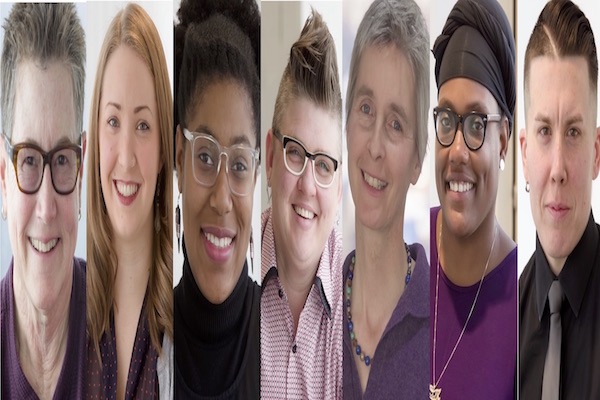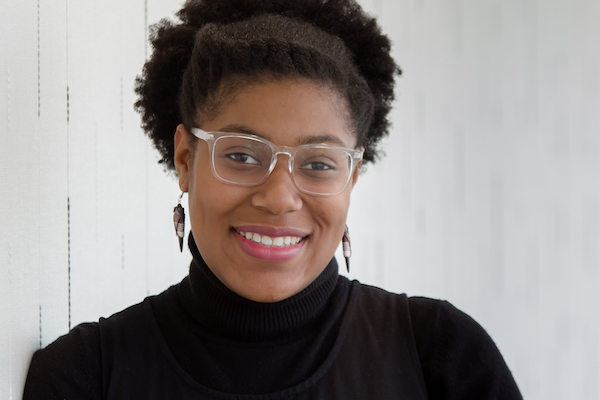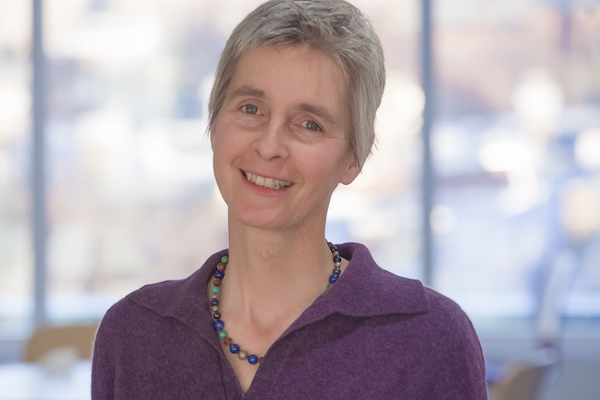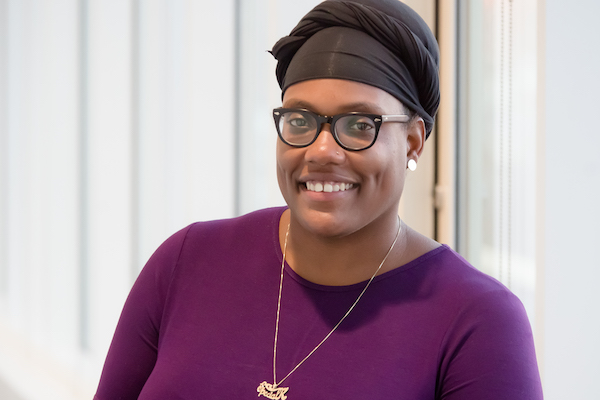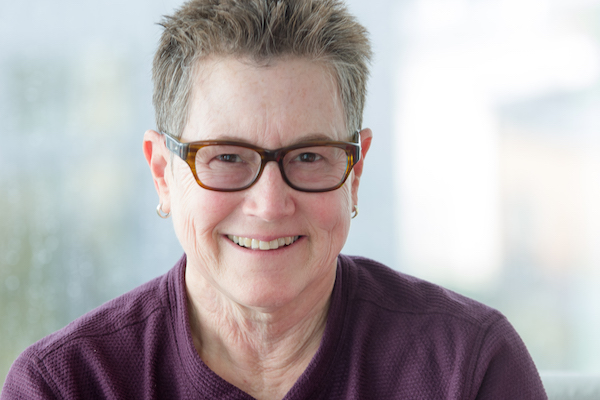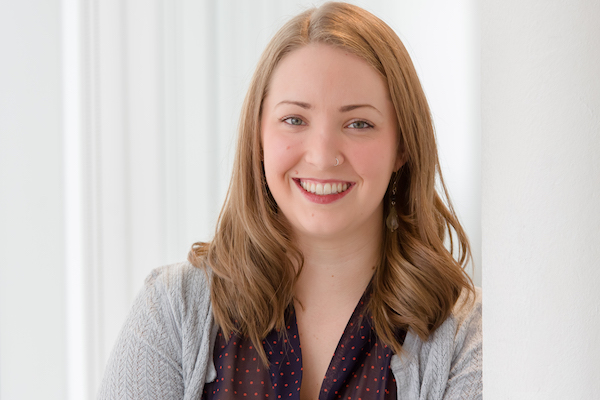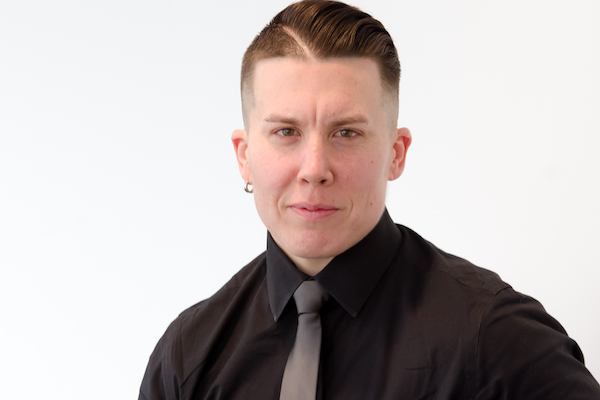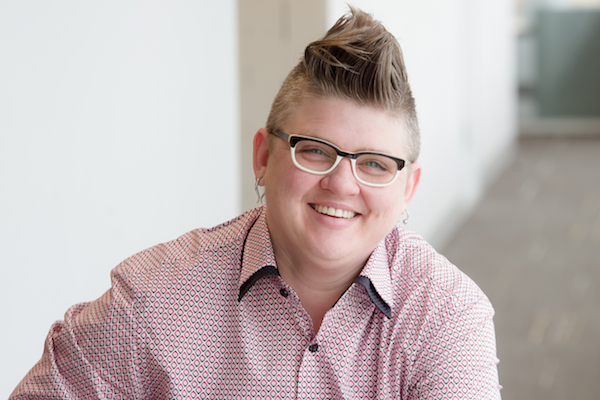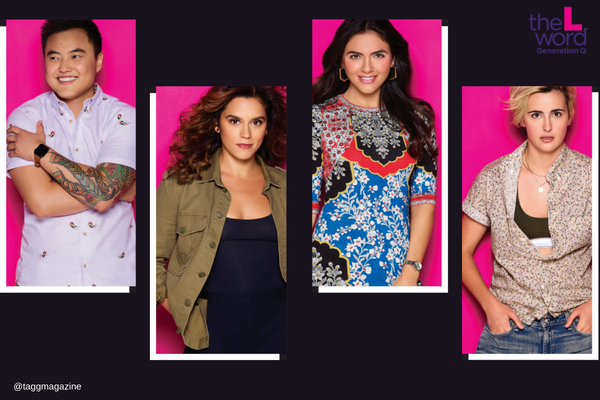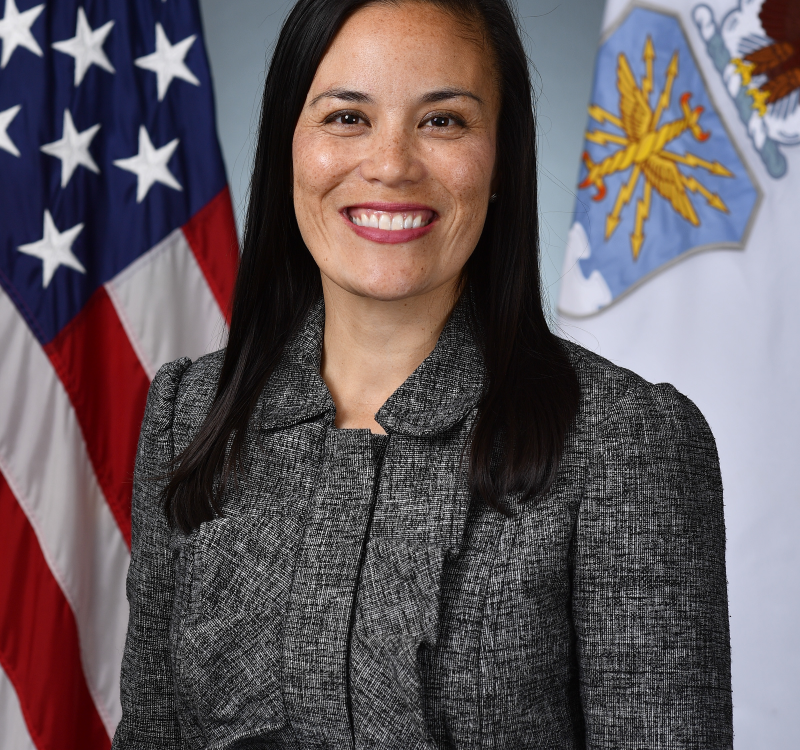
BARE Ladies Party Celebrates Eight Years
January 19, 2017
When Nutritional Values Collide: Navigating Multivore Love Relationships
January 22, 2017Feature: 7 People Leading LGBTQ Health
Jewel Addy
By Vickey Casey
When Jewel Addy was figuring out her future, she knew that she did not want to work in a big PR firm. She wanted to work with one organization and help them build their brand. She found exactly that and more at Whitman-Walker Health in Washington, D.C.
“Out of all the places that I was interviewing with, Whitman-Walker seemed the most fitting for what I wanted to be a part of,” says Addy. “I like the work that we do. I like the people that we serve and I like to feel like I’m making a difference when I’m coming to work.”
The 23-year-old East Coast native, with West African roots, has been with Whitman-Walker Health since her college days. Upon graduating, her internship became a full-time position in June 2015. On December 16, Addy became the External Affairs manager, which allows her to take lead roles in communications planning, media relationships and partnerships, and social media planning and strategy.
Addy has worked to create social spaces for queer women within the community in the form of a program called Women of Whitman-Walker. Here they bring queer women together with artists and authors who understand or share their experience. She also partnered with Tagg Magazine, Capital Pride, and Ladies of Lure during D.C.’s pride weekend, and together they added a queer women centered party to the list of events.
Her work with Whitman-Walker Health is in opposition to her family and culture’s beliefs. “A lot of my elders were not LGBT friendly,” says Addy. “They were actually very much against the gay community and I never understood why that was.” She does not agree with their views. Instead she is, “doing [her] part as an ally to the community to fight the culture I grew up in.”
Jutta Brettschneider
By Angelo C. Louw
When she’s not helping people improve their quality of lives through occupational therapy, Jutta Brettschneider is mainstreaming LGBTQ in public healthcare and calling for massive reform in the system.
Brettschneider has spent the past 35 years helping people of all ages, backgrounds, and abilities from all over the world become more aware of how they move in their bodies so they can avoid injuries, and get rid of pains and strains. She founded the Movement Clinic in Prince Georges County in Maryland.
She works closely with members of the LGBTQ community and says that many of its members live under great stress due to conservative attitudes toward same-sex relationships.
“The more one is challenged living one’s gender or sexual identity, the more we tend to go in survival mode. And all that gets more complex because we have more than just that identity,” she says.
“If I was a person of color and transgender with no family support, I am in a different place then being a lesbian or gay 50-year old, married with a well-paid job and corporate health insurance, or a queer teen who just learned that next month [they] need to move out of their parents’ apartment.”
One way Brettschneider tries to change social attitudes toward LGBTQ people is by including queer identities during lectures with her students at Howard University.
“I am a clinical instructor and bring LGBTQ up when we do role play and create scenarios, welcoming them to the metropolitan city of D.C.,” she says. “I have found that more and more students include LGBTQ in their case scenarios in competency exams, which shows me it becomes part of their reality.”
She is hopeful that attitudes toward LGBTQ individuals will become more favorable, at least for more urban areas. “I feel LGBTQ people are becoming more visible and are simply a reality. We do not need to discuss whether it is legitimate to live our lives but how we want to live it.”
Riana Buford
By Angelo C. Louw
Riana Buford’s innovative approach to advocacy and awareness afforded this Howard University graduate a fast move from intern to Health Educator at D.C.-based health center Whitman-Walker Health.
Buford launched her post-graduate career as an intern for the Mautner Project before transitioning into a full-time role as Health Outreach Coordinator, whose key responsibilities are related to tobacco outreach and advocacy. After a year of successful roll-out, she was promoted to Educational Programs Associate.
She says the success of the tobacco awareness campaign rested largely on working with other LGBTQ organizations to reach a much broader demographic.
“Being able to connect with other LGBTQ organizations allowed us to expand our educational reach to populations that may not necessarily have been our original target audience,” Buford explains.
Buford’s current role includes supporting the management and implementation of health education and training programs. Her scope has widened to include HIV awareness and testing, as well as breast health and screenings.
While an ace at what she does, the job can be challenging at times. She says stigma around HIV is probably the biggest challenge she faces in her advocacy work.
“Right now a lot of my work is around HIV transmission and testing. I see a plethora of young people who lack the knowledge of how HIV is transmitted and use language that can be self-stigmatizing and detrimental,” she says.
“In my work, I always try to meet people where they are in terms of knowledge and educate people, especially young folks, on ways to be safer and less judgmental.”
Buford says there are many misconceptions around the sexual health of lesbians, the biggest being that lesbian couples do not need to use barriers or seek routine HIV or STI screenings.
“Because many STIs are transmitted skin-to-skin, it is my job to educate all clients on their risk of contracting STIs,” she says. “Routine HIV testing at Whitman-Walker Health includes STI testing at the client’s request.”
Barbara Lewis, PA-C
By Annie Brown
A practicing physician assistant for nearly 40 years, Barbara Lewis, PA-C works as a staff physician assistant at Whitman-Walker Health. In addition to seeing patients of all genders for primary care, Lewis sees a significant number of HIV patients and transgender patients.
Lewis is a longtime leader in LGBTQ health in Washington, D.C. While managing the Washington Free Clinic in 1972, Lewis founded a women’s health night, drawing inspiration from the women’s health movement and the book Our Bodies, Ourselves. Through the group, Lewis hoped to empower women to be in control of their health. The group inspired gay men to create a similar group for themselves; it was this group that evolved into the Whitman-Walker Clinic.
Lewis began Howard University’s physician assistant program in 1975. Upon finishing the program in 1977, she worked in the Howard University Hospital emergency room until 1989. During this time, Lewis remained involved in lesbian health, co-founding a lesbian health center at Whitman-Walker as a volunteer in 1979. At the onset of the AIDS outbreak in the 1980s, she continued to volunteer at Whitman- Walker, treating HIV patients. Lewis worked at the George Washington University AIDS Clinical Trials Unit from 1989 until 2000, when she joined Whitman- Walker full-time.
Day to day Lewis works with her patients to empower them to take charge of their health and live healthy lives. She says “Helping patients navigate their medical care, get what they need, and feel comfortable in a medical setting” is the most rewarding aspect of her job.
In her spare time, Lewis enjoys recreational dancing, playing golf, attending concerts and theatrical performances, and traveling. She is a longtime member of a Jewish lesbian group.
Signey Olson
By Vickey Casey
A semester at American University is all it took to convince Signey Olson—a 27-year-old medical professional from Wisconsin—to make a life for herself in Washington, D.C. “When I did my program, it was the first time I was exposed to such an amount of culture,” says Olson. “I was coming in contact with concepts and ideas I’d never even heard of.”
Olson is a certified nurse midwife. After completing her residency at George Washington University Hospital she joined Columbia Fertility Associates. Here she provides fertility services, OBGYN exams, wellness exams, transgender hormone therapy, and referrals to specialists. She also works to make the center more inclusive to all patients. Thanks to her diligence, all intake forms now have gender neutral and inclusive language.
All OBGYN exams Olson performs are consent based because she sees patients who have suffered from sexual trauma and assault. “I approach everybody with a trauma-informed mindset,” says Olson. “So asking
permission to touch any part of the body, talking to people with their clothes on before any physical exam, always screening for any sort of violent encounters and providing referrals if they share that with me.”
Olson’s passion for medical inclusivity started during her undergraduate days, when friends seeking medical care struggled for adequate resources. “I have a lot of important people in my life that are on the gender variant spectrum and listening to some of their stories about prior interactions with the medical community was awful to hear,” Olson explains. “Choosing to work in this field has a lot to do with [their] personal experiences, and really wanting to offer a service that is really inclusive of all people regardless of gender or orientation.
“I just really felt like the community needed a provider in that field that was really inclusive and was coming at it from a place of celebration rather than tolerance.”
Kris Oseth
(Kristina Oseth, LPC)
By Annie Brown
As a licensed professional counselor working both at Whitman-Walker Health and in a private practice,
Kris Oseth enjoys helping others enhance their own understanding of themselves, find their own strength to navigate life’s challenges, and work on specific goals. With a strong and purposeful connection to serving the communities he belongs to, Oseth dedicates his skill-set to focus on LGBTQ health.
Oseth is a psychotherapist for Whitman-Walker’s addictions and substance use programs. He facilitates an outpatient harm reduction group for substance use management.
“I have seen the lives of so many clients transform in deep and meaningful ways when they start taking a look at problems related to substance use—whether they desire to stop using one or more substances or choose to take a harm reduction [and/or] a substance use management approach,” Oseth says.
In his private practice, Oseth has the opportunity to work with a diverse range of clients, particularly transgender and gender-expansive individuals. “I really enjoy providing a space for clients to explore their authentic gender experience,” he says.
Oseth’s approach to therapy is client-centered and uses whichever modalities best address his patients’ goals for therapy. These modalities often include cognitive-behavioral therapy, mindfulness approaches, and interpersonal or family systems approaches. Oseth’s work is also trauma-informed, since many of his clients have experienced interpersonal, social, or systemic abuse and trauma.
Oseth is also a certified personal trainer (CPT). “Personal training affords me the opportunity to work with clients in a way that I cannot through psychotherapy,” he says. Oseth’s personal training can be tailored to each client’s unique goals and does not have to center around body composition. He loves seeing how physical fitness enhances clients’ connections with their bodies, particularly with transgender and gender-expansive clients who may feel disconnected due to body dysphoria or social invalidation.
Outside of his work, Oseth enjoys his time at the gym, local theater, burlesque shows, queer performances, reading, and watching Netflix.
Frances Reed, LMT
By Annie Brown
As the owner of Freed Bodyworks, Frances Reed is committed to maintaining a space where radical inclusion meets healing and holistic wellness. Over the past five years, Reed has built a team of nearly 20 practitioners that do bodywork, energy work, herbal medicine, and psychotherapy.
Reed founded Freed Bodyworks in 2011 to address the unmet healing needs of trans and queer individuals. When they first entered massage school, Reed was the only person with a non-binary identity. They quickly found that most massage therapists in training were unprepared to work with gender-nonconforming individuals and their bodies. Giving practice massages to non-binary individuals for homework, Reed often heard comments like, “I would never risk getting a massage if it weren’t for you.”
Because physical pain, extreme stress, and trauma have above-average incidence in trans and queer communities, Reed knew they needed to create a place where people could ease these pains without the fear of being re-traumatized.
As Freed has grown, Reed’s interests have expanded. “I found that gender nonconformity was not the only type of body-based marginalization I was passionate about impacting,” Reed says. “Large bodies, trauma survivors, people of color, people with history of eating disorders, members of the kink community, and people with seen and unseen disabilities became part of our mission.”
Reed has big goals and expectations for 2017. In addition to seeing more clients for massage, they are teaching a course called “Massage & Stretching for Those Who Bind” and writing a book about bodywork for transgender clients.
Ultimately, Reed encourages anyone who might be reluctant to seek massage and bodywork to give it a try. “You are safe at Freed,” they say. “We are a team committed to non-judgment and all of our practitioners are culturally competent. Please do not live in chronic pain—you deserve access to quality therapeutic work.”


